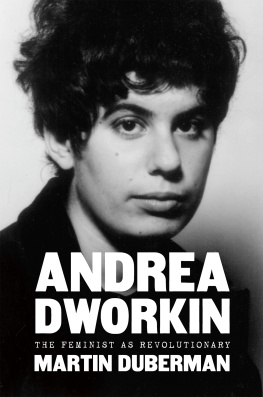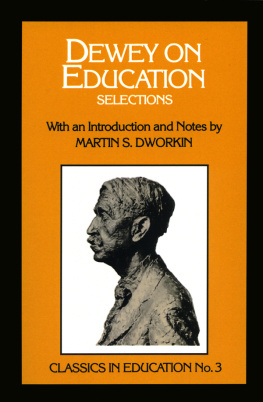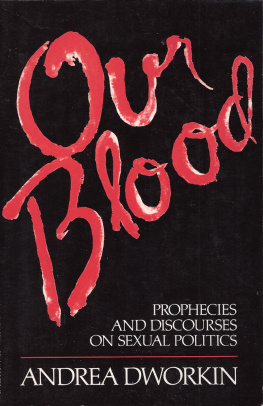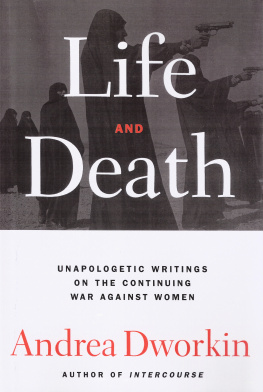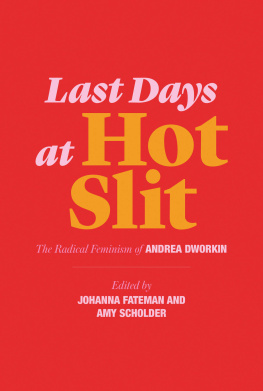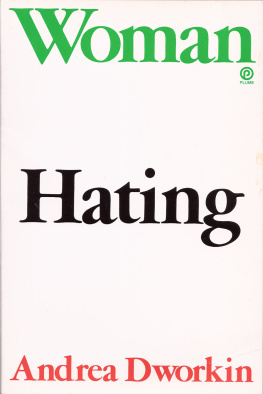Dworkin - Last Days at Hot Slit: The Radical Feminism of Andrea Dworkin
Here you can read online Dworkin - Last Days at Hot Slit: The Radical Feminism of Andrea Dworkin full text of the book (entire story) in english for free. Download pdf and epub, get meaning, cover and reviews about this ebook. year: 2019, publisher: MIT Press, genre: Romance novel. Description of the work, (preface) as well as reviews are available. Best literature library LitArk.com created for fans of good reading and offers a wide selection of genres:
Romance novel
Science fiction
Adventure
Detective
Science
History
Home and family
Prose
Art
Politics
Computer
Non-fiction
Religion
Business
Children
Humor
Choose a favorite category and find really read worthwhile books. Enjoy immersion in the world of imagination, feel the emotions of the characters or learn something new for yourself, make an fascinating discovery.

- Book:Last Days at Hot Slit: The Radical Feminism of Andrea Dworkin
- Author:
- Publisher:MIT Press
- Genre:
- Year:2019
- Rating:3 / 5
- Favourites:Add to favourites
- Your mark:
- 60
- 1
- 2
- 3
- 4
- 5
Last Days at Hot Slit: The Radical Feminism of Andrea Dworkin: summary, description and annotation
We offer to read an annotation, description, summary or preface (depends on what the author of the book "Last Days at Hot Slit: The Radical Feminism of Andrea Dworkin" wrote himself). If you haven't found the necessary information about the book — write in the comments, we will try to find it.
Dworkin: author's other books
Who wrote Last Days at Hot Slit: The Radical Feminism of Andrea Dworkin? Find out the surname, the name of the author of the book and a list of all author's works by series.
Last Days at Hot Slit: The Radical Feminism of Andrea Dworkin — read online for free the complete book (whole text) full work
Below is the text of the book, divided by pages. System saving the place of the last page read, allows you to conveniently read the book "Last Days at Hot Slit: The Radical Feminism of Andrea Dworkin" online for free, without having to search again every time where you left off. Put a bookmark, and you can go to the page where you finished reading at any time.
Font size:
Interval:
Bookmark:
Selection and compilation copyright 2019 by Johanna Fateman and Amy Scholder. Introduction copyright 2019 by Johanna Fateman.
Texts by Andrea Dworkin copyright 2005, 2007, 2014 by The Estate of Andrea Dworkin. All rights reserved.
This edition Semiotext(e) 2019
See Permissions on page 405
All rights reserved. No part of this book may be reproduced, stored in a retrieval system, or transmitted by any means, electronic, mechanical, photocopying, recording, or otherwise, without prior permission of the publisher.
Published by Semiotext(e)
PO BOX 629, South Pasadena, CA 91031
www.semiotexte.com
Special thanks to Robert Dewhurst and John Ebert.
Cover Design: Lauren Mackler
Back Cover Photograph: Robert Giard, Andrea Dworkin, 1992
Layout: Hedi El Kholti
ISBN: 978-1-63590-080-4
Distributed by The MIT Press, Cambridge, Mass. and London, England
Printed in the United States of America
LAST DAYS AT HOT SLIT:
The Radical Feminism of Andrea Dworkin
Black-and-white photos show a hippie couple in a city-hall ceremony in Amsterdam. The bride is not the Andrea Dworkin we know, who wore a uniform of denim overalls and sneakers, militant and unmitigated by a single capitulation to feminine beauty standards. This one is very young, just twenty-two, with black-rimmed eyes and a chin-length hair cut with bangs. In a letter from April 1969, she writes to her parents in New Jersey about her wedding, no one gave me away. in the ceremony we promised to respect each other.
In New York, the womens movement was charging forward, still in its first exhilarating years. Just two months before Dworkin said I do, Ellen Willis and Shulamith Firestone founded the action-oriented radical-feminist group Redstockings. And soon after, Willis reports, from a fly-on-the-wall perspective for the New Yorker,experts on illegal abortion. Though one day Willis would become Dworkins enemy, Firestone would first become her hero for writing The Dialetic of Sex (1970). And the Redstockings winning tacticof which their disruption that day was just one early examplewould become Dworkins guiding principle, her religion: The advance guard of the second wave showed that by casting off stigma and shame, by forcing their stories into the public record, they could open the floodgates of womens rage to change the culture and the law.
In September 1971 Dworkin writes home in tall, fast cursive. Its her handwriting, but not the writer we know. Composed in the aftermath of a cataclysmic visit from her parentsduring which they witnessed her husbands rage and saw him hit her; during which she begged them to take her away and they refusedthe long letter is an excruciating document of concealments, excuses, and apologiesall things she would eradicate from her prose shortly. By November, shes living as a fugitive. At her husbands hands shes been disabusedalmost fatallyof her faith in the male-led Left. Now she hides from him on a farm, on a freezing houseboat, or in the basement of a nightclub, with the help of a new lover. Ricki Abrams brings her booksFirestones, which introduces the concept of the sex-class system, Robin Morgans anthology Sisterhood is Powerful (1970), and Kate Milletts Sexual Politics, from the same yearand together the two women begin to work on one of their own.
In between her letters home, in which she puts on a brave face and asks for money until she can get back on her feet, Dworkin writes with Abrams about fairy tales, foot binding, witch burning, and porn. Until finally, in 1972, desperate and destitute, she agrees to carry a briefcase of heroin through customs in exchange for a thousand dollars and a ticket to New York. The dope-smuggling plan falls through, but Dworkin keeps the money and gets away, carrying with her a ticket to a writers lifean unfinished manuscript shes thinking of calling Last Days at Hot Slit.
The draft she arrived in New York with would ultimately become Woman Hating, published in 1974 (Abrams would decide not to be part of the final version), and this collection is titled for her abandoned ideachosen to memorialize her escape, the high stakes of her literary debut, and the apocalyptic, middle-finger appeal of her prose. It opens with a postcard written four years after her wedding. In New York with Gringo, the beloved German shepherd she somehow rescued from Amsterdam, shes divorced and ecstatic, working as an assistant to the poet Muriel Rukeyser. Dworkin thanks her parents for their money and solicits their pride, brazenly demanding to be loved for who she really isnow, the author of a truly incendiary feminist text.
_____
Through chronological selections from Dworkins lifetime of restless outputexcerpts from her most infamous nonfiction works and examples of her overlooked fiction, as well as two previously unpublished worksLast Days at Hot Slit aims to put the contentious positions shes best known for in dialogue with her literary oeuvre.
And so, in the feminist insistence that women have the right to make and use pornography, to choose sex work, to engage in every kind of consensual act without shame, and to do so as revolutionaries, Dworkin is the censorial demagogue to shoot down. But nearly four decades after the historic Barnard Conference on Sexuality, which drew the battle lines of the feminist sex warspro-sex feminists staking out territory for the investigation of pleasure, while Women Against Pornography protested outsideand nearly three decades since the ascendance of the third wave signaled her definitive defeat, we hope its possible to consider what was lost in the fray.
This collection is the product of years of conversation. When Amy Scholder, my co-editor, invited me to contribute to Icon (2014)a collection of nine personal essays, for which each author chose a public figure who influenced, intrigued, or haunted hershe reignited a teenage obsession of mine, which proved to be contagious. By choosing Dworkin as my subject, I returned to a moment in the 1990s, when my discovery of her militant voice fueled my nascent feminist rage, and when I quickly disavowed her politics with the kind of clean, capricious break that youth affords. But for Amy and me both, in reading Dworkins books with fresh eyesmeasuring them against her lingering presence in feminist discourse as a symbol, frozen in time at the helm of a failed crusadewe found much more than the antiporn intransigence shes reviled or revered for.
Dworkin was a philosopher outside of and against the academy, one of the first writers to use her own experiences of rape and battery
_____
Born into a lower-middle-class Jewish family in Camden, New Jersey, in 1946, Dworkin was raised under the specter of the Holocaust, in the hushed home of a frequently bedridden mother. Sylvia Dworkins heart condition is prominent in Andreas portrayal of her childhood. She and her brother Mark are separated and sent to live with relatives during Sylvias hospital stays; Harry, their father, is often absent, working two or more jobs so his wife can see the best doctors. Andrea keeps Sylvia alive through psychic vigilance and peaceful conformity, she thinks. Conversely, she makes her sicker with the disruptive force of her true personality.
Childhood is a long, drawn-out loss of girlish illusions, as it becomes clear, through a series of painful lessons, that her ambitionsto be a poet, to obey only her instinct for adventureare categorically male. Theres a mythic dimension to this narrative: The female heros journey is a search for greatness and meaning, in which rebellion and naivet alike are punished by stunning sexual cruelty. And there is no home to return to, transformed or not.
Her life comes into focus through the overlapping accounts of her essays and fiction. At age nine, left alone for the first time to see Her novel
Next pageFont size:
Interval:
Bookmark:
Similar books «Last Days at Hot Slit: The Radical Feminism of Andrea Dworkin»
Look at similar books to Last Days at Hot Slit: The Radical Feminism of Andrea Dworkin. We have selected literature similar in name and meaning in the hope of providing readers with more options to find new, interesting, not yet read works.
Discussion, reviews of the book Last Days at Hot Slit: The Radical Feminism of Andrea Dworkin and just readers' own opinions. Leave your comments, write what you think about the work, its meaning or the main characters. Specify what exactly you liked and what you didn't like, and why you think so.

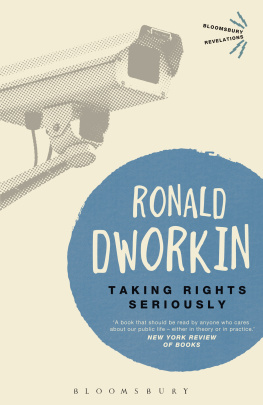
![Dworkin - Life and death : [unapologetic writings on the continuing war against women]](/uploads/posts/book/97794/thumbs/dworkin-life-and-death-unapologetic-writings.jpg)
